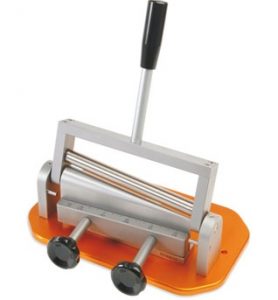Home » Products » Physical Test Equipment » Elasticity / Resistance Deformation Testers » Elcometer 1510 Conical Mandrel Bend Tester
Elcometer 1510 Conical Mandrel Bend Tester

Product Description
The Elcometer 1510 Conical Mandrel Bend Tester is used to determine the effects of bending on the elasticity, adhesion and elongation properties of cured coatings on sheet metal.
The frame has a bending lever with a roller which pivots on a steel conical mandrel with a diameter from 3.2 – 38.1mm.
A graduation indicates the mandrel diameter in both mm and inches.
The specimen can be bent on part of, or along, the entire length of the mandrel, and the results (cracks) corresponding to different test diameters can be observed in a single operation. This is ideal for use in conjunction with the cylindrical mandrel, as it identifies the stop point for more focused testing.
As the instrument is machined out of a solid block of steel, the particularly robust and rigid construction provides excellent resistance to wear and provides long service life. A large, sturdy anodised base, which can be permanently fixed to a workstation, ensures stability during testing.
The Elcometer 1510 Conical Mandrel Bend Tester can be used in accordance with:
• ASTM D 522-A
• BS 3900-E11*
• ISO 6860
* Standards not in bold have been superseded but are still recognised in some industries
Specifications
Elcometer 1510 Conical Mandrel Bend Tester – Specifications
| Part Number | Description | Certificate |
| K0001510M001 | Elcometer 1510 Conical Mandrel Bend Tester | ο |
| Diameter Range | 3.2 – 38.1mm | |
| Sample Size | 180 x 100 x 0.8mm | |
| Dimensions | 325 x 350 x100mm | |
| Weight | 9kg |
ο Optional Calibration Certificate available
Packing List
- Elcometer 1510 Conical Mandrel Bend Tester
- Operating Instructions
Data Sheet
Elcometer 1510 Conical Mandrel Bend Tester – Data Sheet
Elcometer 1510 Conical Mandrel Bend Tester Data Sheet
Standards
Elcometer 1510 Conical Mandrel Bend Tester – Standard
The Elcometer 1510 Conical Mandrel Bend Tester can be used in accordance with:
• ASTM D 522-A
• BS 3900-E11*
• ISO 6860
* Standards not in bold have been superseded but are still recognised in some industries

